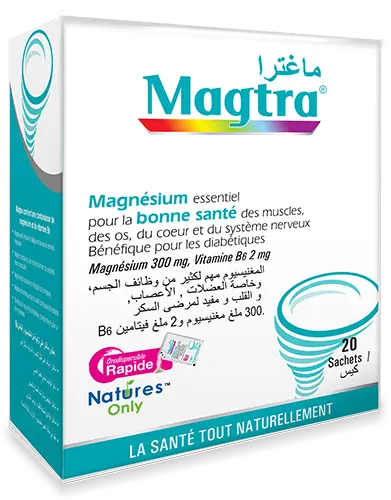
Magnesium plays a role in over 300 enzymatic reactions within the body, including the metabolism of food, synthesis of fatty acids and proteins, and the transmission of nerve impulses. Magnesium is vital for the proper functioning of hundreds of enzymes.
Magnesium
Magnesium is one of seven essential macro minerals. An adequate intake helps to prevent problems with bones, the cardiovascular system, diabetes, and other functions
- Readily absorbable, Melt in mouth formula, once daily dosage
- Optimal recommended daily dosage to meet daily magnesium requirement
- Helps in management of migraine, depression, and epilepsy
The recommended magnesium supply is 300 to 400 mg per day for adolescents and adults.
Magnesium products in different dosages and dosage forms can provide support in reaching your daily magnesium requirements. If you want to be certain of quality, obtain your magnesium from the pharmacy.
As a general principle, athletes, adolescents, people under stress, pregnant and breastfeeding women, and diabetics have an increased magnesium requirement. For these individuals, a sufficient magnesium supply with the help of high-dosage magnesium products is especially important.
An insufficient magnesium supply can express itself in an increased susceptibility towards stress, reduced performance ability, and fluctuations in general well-being. Trembling, muscle twitching (above all in the eyelids), or muscle and calf cramps can also be signs of magnesium deficiency.
In general, a longer-term magnesium supply (over at least 4 – 6 weeks) is necessary to replenish the body’s magnesium reserves – this also applies for higher-dosage magnesium products.
Taking high-dosage magnesium combats the most well-known cause of muscle and calf cramps: magnesium deficiency. The brain sends stimuli (impulses) through the nerves to the muscles. Similar to an electrical current, the impulse “flows” from the nerve cells into the muscle cells and stimulates them to contract. Every contraction is followed by a phase of relaxation, a process that only functions when sufficient magnesium is present in the muscle cells.
Magnesium deficiency often occurs when individuals are actively involved in sports, because the body is already losing the important mineral through sweating. However, for friction-free muscle activity and to prevent muscle cramps and muscle trembling, it is very important to make sure your daily magnesium requirement is covered.
Muscle tension caused through stress, such as frequent stiffness of the neck, can also be alleviated by magnesium because magnesium is important for vital muscle functions. The more severe the stress, the more magnesium is required by the organism.
Investigations showed that high-dosage magnesium can reduce the frequency of migraine attacks and decrease the intensity of the attacks. However, this means 300 mg of magnesium daily over a period of at least six months.
Certainly, whereas the daily requirement of adult women is usually roughly 300 mg per day, this increases for pregnant and breastfeeding women to 310 – 390 mg. This amount is important for the development of the growing child because magnesium also plays a role in cell division and contributes towards normal protein synthesis and muscle function. Apart from this, magnesium reduces fatigue and exhaustion.

Follow Us @naturesonlyglobal